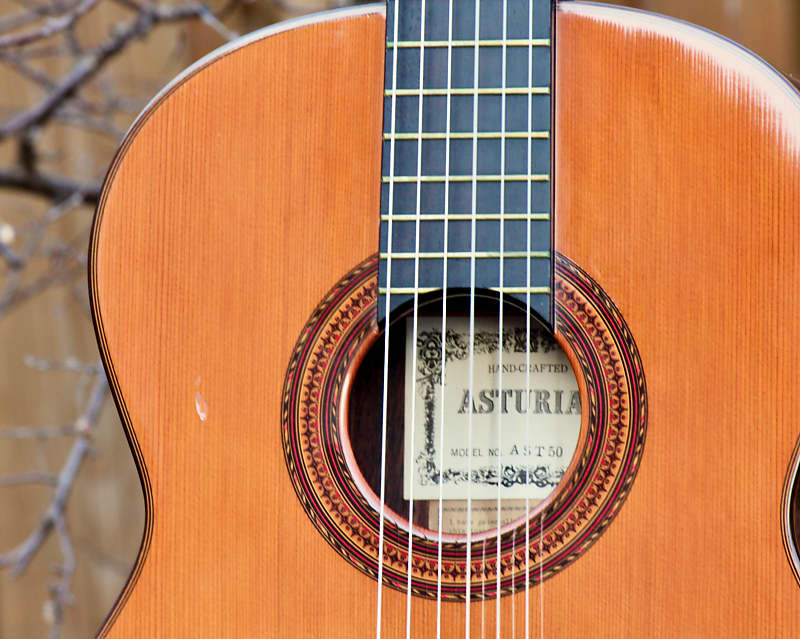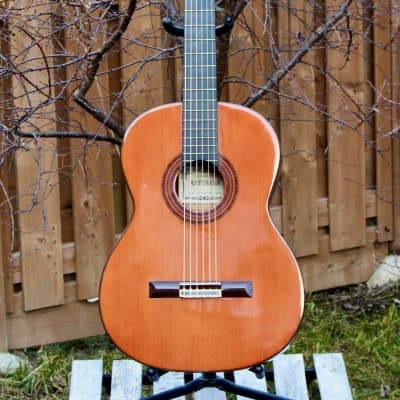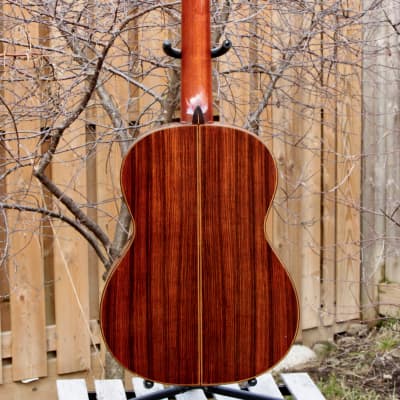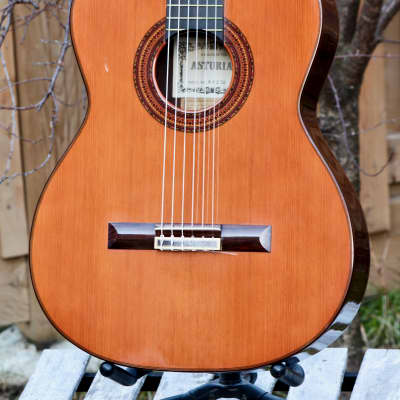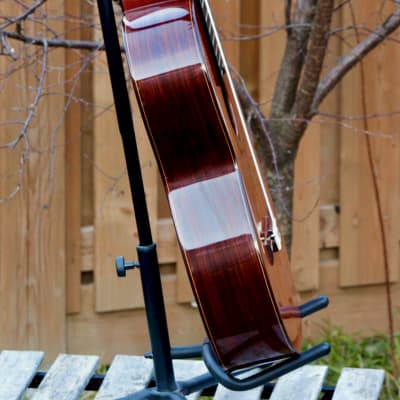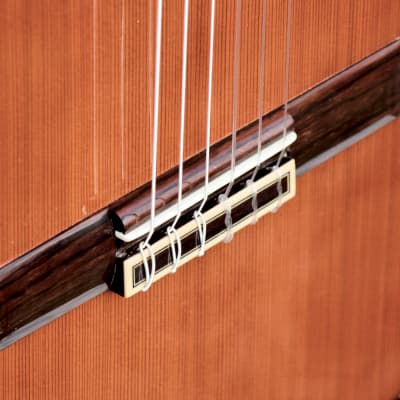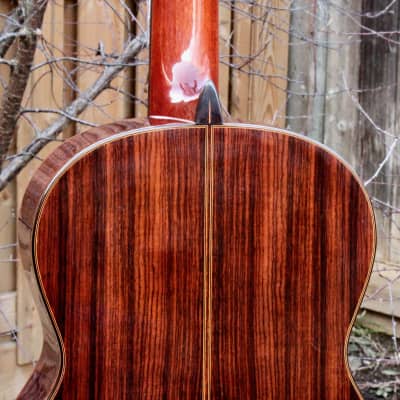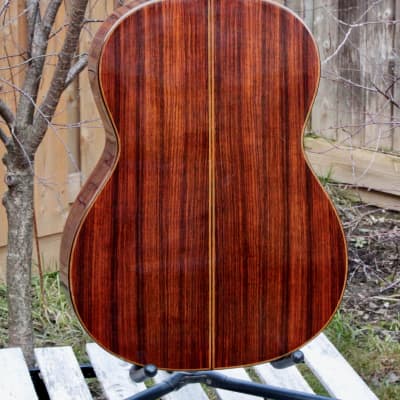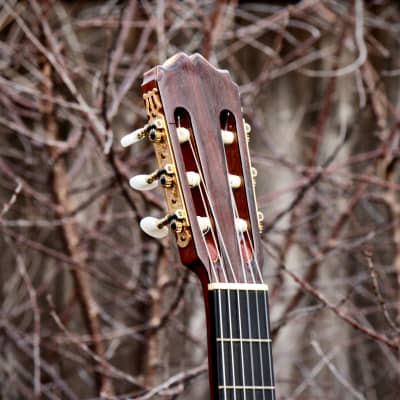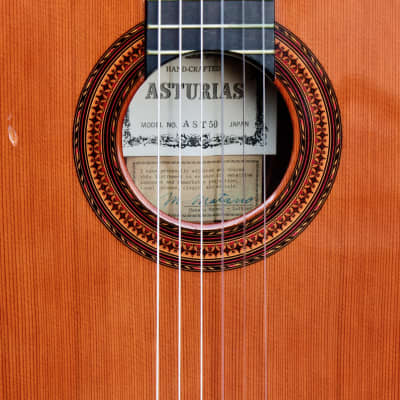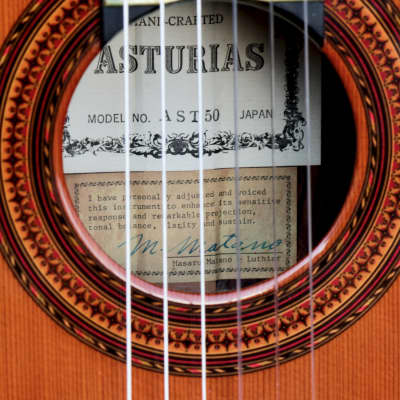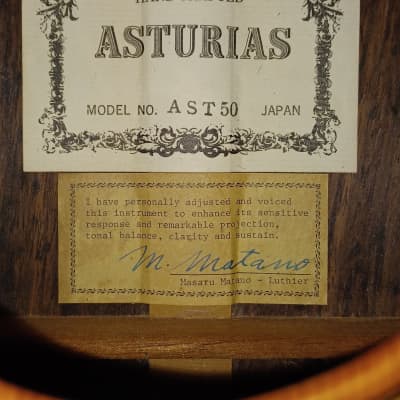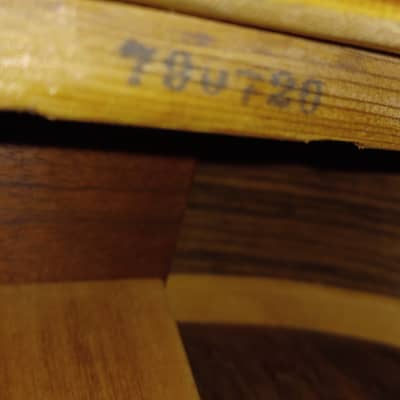A beautiful Asturias AST-50 Handmade Classical Guitar, set up and signed by Masaru Matano in 1979.
More info on Matano guitars below the Specs.
The guitar is a concert class instrument with excellent volume and sustain, wide dynamic range, well balanced trebles and basses.
Condition
The condition of this guitar is unbelievable considering it's 44 years old.
It's in great condition considering the age with very few minor signs of use that can only be seen up close.
The guitar has been kept in a room with humidity set to 50% at 25 degrees (75F).
The neck is straight, action is medium low, comfortable to play.
Specs.
Top: High Grade Solid Red Cedar
Bracing: Fan
Back / Sides: Indian Rosewood
Finish: Polyurethane
Neck: Mahogany, Natural Bone Nut
Fingerboard: Rosewood
Bridge: Rosewood, Natural Bone Saddle
String Length: 650 mm
Nut width: 52 mm
Action at 12 fret (1st): 3.25 mm
Action at 12 fret (6th): 3.5 mm
Ships in a soft case (gig bag)
Asturias Story and Japanese Luthier tradition.
Asturias guitars have gained widespread acclaim internationally for their exceptional tone and quality of craftsmanship. Produced at the same small workshop in Kurume, Japan, the team comprises approximately 10 highly skilled craftsmen, each capable of independently crafting a guitar. Since 1981, the workshop has been under the leadership of master luthier Wataru Tsuiji.
The Kurume workshop's guitar-making journey began in 1962 as Meiko Gakki co., under the ownership of the legendary Japanese luthier Masaru Matano, known as "the genius of sound." Matano earned this title before 1962 by enhancing the sound of numerous old violins, including renowned Stradivarius violins.
Initially, Meiko Gakki workshop focused on crafting classical guitars in limited numbers with a strong emphasis on quality. These guitars were initially sold under the Meiko Gakki label and signed by Matano. Around 1968, the labels were changed to "Masaru Matano Constructor de Guitarras," and by 1974-1975, another series of guitars with unique design labels was introduced, indicating production in Fukuoka, Japan.
Beyond this, during the same period of 1974-1975, Matano, along with a group of associates, produced La Esperanza guitars under the label "Ongaku Geijutsusha Co." Unlike Matano's guitars, La Esperanza guitars predominantly featured Spruce tops and Ramirez-style headstocks. While most of Matano's label guitars were not signed, many La Esperanza guitars had labels signed by their actual makers. The production of La Esperanza guitars continued until 1982, though in limited quantities.
Matano, like many luthiers, always worked with a team of highly skilled associates. Tatsuo Tanaka, his associate in the late 1960s, was the only one allowed to put his name on Meiko Gakki labels. The names of other associates, including Hiroumi Yamaguchi and Eichi Kodaira, remain unconfirmed, but they later joined the "New" Asturias team in 1980. In 1980, Rokkomann Co took over Matano's Kurume workshop, marking the birth of the "New" Asturias workshop. The details of this transition and Matano's disappearance in 1981 remain unclear.
Since 1981, Wataru Tsuji has led the Asturias workshop. In the same year, the "New" Asturias workshop implemented a serial number system on labels. The design, created in the mid-1970s, remained unchanged and was used on some of Matano's guitars.
Notably, associated luthiers such as Hiromi Yamaguchi, who established the "Cervantes" Concierto Guitarras brand in the early 1970s, and Eichi Kodaira, responsible for making AST models within the "New" Asturias team, played crucial roles. The narrative also highlights the continued success of Kodaira's workshop, operating with only three employees.
Guitars crafted by these Asturias-associated luthiers are highly regarded by international players for their quality, often considered the best in the mid-price range for classical concert guitars. It's essential to note that the pricing of guitars made by these artisans has consistently been moderate compared to similar-grade guitars by Masaru Kohno and other Japanese elite luthiers. Until 1980, Matano's top model, the Classe 1000, was priced at 100,000 yen, competing favorably with Masaru Kohno #20 from the same year. Until 1982, top Cervantes, La Esperanza, and Ecole models were also priced at 100,000 yen.
More general history on Vintage Japanese Classical Guitars.
From the late 1960s Japanese luthiers produced guitars of exceptional quality. These skilled craftsmen typically ran small shops, employing a handful of master builders who were often trained in Spain or under Spanish master builders in Japan. During this period, bans on certain types of wood were not yet in place, allowing luthiers to source high-quality wood for their creations. Although these guitars are considered a bargain in today's market, finding top-quality Japanese classical guitars from this era can be challenging, and restrictions on exporting certain types of wood make them even more difficult to obtain. Similar guitars built with comparable materials today would cost significantly more due to the scarcity or complete bans on certain types of wood. Most of those talented luthiers from the 70s and 80s are now retired or have passed away.
Please feel free to contact me if you have any questions.
Shipping
PLEASE NOTE that shipping times are not guaranteed due to pandemics, holidays, other disruptions etc.
Flat rate $150 to the US and Canada, $450 to Europe.
We ship with express service with tracking number the next day after payment clears.
US: Expedited Parcel 4 - 7 days $150
Canada: Canada Post Xpresspost 3-5 days $150
UPS / DHL - Please enquire
EUROPE:
Canada Post Expedited Parcel, 10 - 12 days $450
UPS will be about $600, 3-5 days (please enquire for a more accurate quote)
Return Policy.
We do not accept returns of used items.
We do our best to make detailed descriptions and use high resolution pictures.
Please study pictures and read the description carefully. Contact us if you have more questions.
==================================================
Please ask any questions prior to bidding, if you have any.
Check my other listings for more guitar stuff.
Let me know if you want combined shipping.
Thanks for looking and good luck!
Sincerely,
Guitar Brain and Co.
